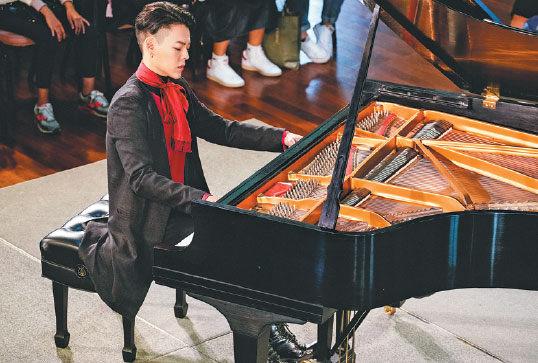Taiwan pianist's debut studio album all about love
By Chen Nan (China Daily) Updated: 2017-02-27 14:17Classical pianist Chiang Tien-lin can be easily mistaken for a rock star with his ear piercings and tattoos.
The artist from Taiwan indeed is one - but of a different kind.
"I want to show that classical music can be very modern and something that the audience can relate to," says the 29-year-old.
The 12 pieces on his debut studio album, Piano Love Song, are adapted from popular Japanese ballads, such as La La La Love Song, I Love You and Snow Flower.
|
Chiang Tien-lin says he wants to show that classical music can be modern and related to today's audiences. Provided to China Daily |
The album was released by Universal Music Group on Feb 14 to mark Valentine's Day.
The album, recorded in Tokyo, opens with a piece titled Snow Flower, an adaptation from the ballad of the same name that was released in 2003 and sung by Japanese actress-singer Mika Nakashima.
The number topped music charts in Japan and sold more than 240,000 copies. The song also has a Chinese version performed by singer Han Xue.
Chiang's album is not just about romantic love. His fingers touch the piano keyboard lightly - creating a feeling of the falling and melting of snowflakes.
The album's second song is inspired by La La La Love Song, recorded by Japanese rhythm-and-blues artist Toshinobu Kubota in 1996. The song was the theme song of the popular Japanese TV series Long Vacation.
"These songs are hard to forget, almost like a longtime ex-girlfriend who keeps haunting you after a breakup," says Chiang.
Chiang learned to play the piano at age 9, competing with his older brother, who was also learning the instrument back then.
But Chiang's brother eventually gave up music and is now a dentist in Taipei. Chiang continued his training and became a pianist.
"From ages 9 to 17, I took a bus alone from Hualien to Taipei to learn piano every week. I still remember the smell of that bus and the four-hour trip. I kept myself awake just in case my stuff got stolen," says Chiang.
He gave his first piano recital at 17 while studying at the Taipei University of Arts, where he learned with German piano professor Rolf-Peter Wille.
"Wille introduced me to a lot of electronic music and chorus singing of R&B musicians. I like playing my instrument without reading the notes. I like improvising a little bit, which is fun," Chiang says, adding that the line between classical music and other musical genres is blurring.
Chinese pop star Jay Chou, for example, introduced music by Chopin and Mozart, which brought his young fans closer to classical music, Chiang says.
"My parents don't know much about classical music. They sometimes ask me to play Teresa Teng's (a Chinese artist) pop songs on the piano because those sound familiar to them."
Chiang has researched not only composers' piano scores but also their biographies to develop his own musical vocabulary.
"It's a process of decoding the composers. They are dead, and there is no way you can talk to them. But their stories, notes and anecdotes give me insights into their music," says Chiang.
In 2014, Chiang gave a piano recital in Taipei, which attracted the attention of cellist Ouyang Nana, who also lives in Taiwan.
The 16-year-old cellist invited Chiang to record her debut album, 15, last year, which was also released by Universal Music Group.
"I played some of the pieces from his debut album as well. His interpretations are inspiring," says Ouyang.
Chiang has also worked with Swiss contemporary dancer Philipp Egil and the Taipei Philharmonic Opera House.
chennan@chinadaily.com.cn
- 'Cooperation is complementary'
- Worldwide manhunt nets 50th fugitive
- China-Japan meet seeks cooperation
- Agency ensuring natural gas supply
- Global manhunt sees China catch its 50th fugitive
- Call for 'Red Boat Spirit' a noble goal, official says
- China 'open to world' of foreign talent
- Free trade studies agreed on as Li meets with Canadian PM Trudeau
- Emojis on austerity rules from top anti-graft authority go viral
- Xi: All aboard internet express












